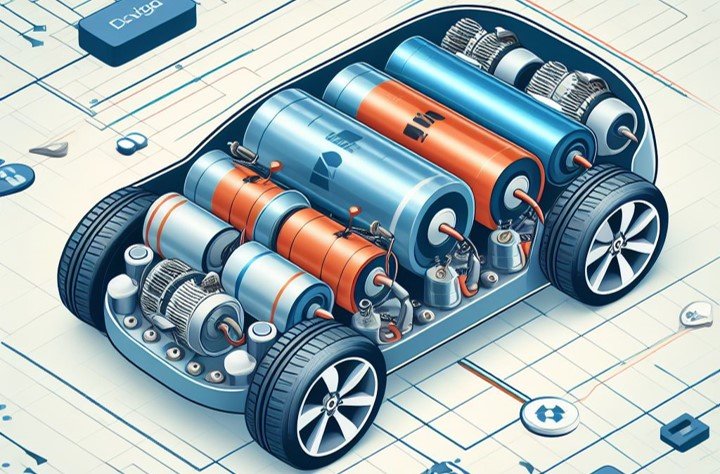The Growing Potential of Hydrogen in Transportation
Hydrogen is emerging as a game-changer in the realm of transportation, offering a clean and efficient alternative to traditional fossil fuels. This versatile element has the potential to revolutionize various modes of transportation, including off-road vehicles, ships, and more. In this article, we will explore three commercialized hydrogen-based products that are already making an impact on the market.
1. Toyota Mirai
One of the pioneers in the hydrogen fuel cell vehicle market is Toyota, with its groundbreaking model, the Toyota Mirai. The Mirai is a hydrogen-powered sedan that emits only water vapor, making it a zero-emission vehicle. With a range of over 300 miles and a refueling time of just a few minutes, the Mirai offers a practical and sustainable solution for everyday transportation.
2. Nikola One
In the realm of heavy-duty trucks, the Nikola One is leading the way with its innovative hydrogen fuel cell technology. This zero-emission truck boasts an impressive range of up to 900 miles, making it a viable option for long-haul transportation. With its commitment to sustainable and efficient transportation, Nikola is driving the hydrogen revolution in the trucking industry.
3. Alstom Coradia iLint
Alstom, a renowned railway transportation company, has introduced the Coradia iLint, the world’s first hydrogen-powered passenger train. This eco-friendly train emits only water and steam, eliminating harmful emissions and reducing noise pollution. With successful operations in Germany and plans for expansion, the Coradia iLint is proving to be a remarkable example of hydrogen’s potential in the railway sector.
The Future of the Hydrogen Economy
The market for hydrogen in transportation is poised for significant growth in the coming years. Governments and industries worldwide are recognizing the importance of decarbonizing the transportation sector, leading to increased investments and policy support for hydrogen-based solutions.
One key driver of market growth is the development of a robust hydrogen infrastructure. As more hydrogen refueling stations are established, the accessibility and convenience of hydrogen-powered vehicles will improve, encouraging greater adoption. Additionally, advancements in hydrogen production technologies, such as electrolysis and renewable hydrogen, will contribute to the expansion of the hydrogen economy.
Key Players in the Hydrogen Economy
Several key players are at the forefront of driving the hydrogen economy and shaping the future of transportation:
1. Hyundai Motor Group
Hyundai Motor Group is a leading advocate for hydrogen fuel cell technology. The company has made significant investments in research and development, aiming to commercialize hydrogen-powered vehicles on a large scale. Hyundai’s commitment to the hydrogen economy is evident through its production of the Hyundai NEXO, a hydrogen fuel cell SUV.
2. Ballard Power Systems
Ballard Power Systems is a global leader in proton exchange membrane (PEM) fuel cell technology. The company specializes in the development and manufacturing of fuel cell systems for various applications, including transportation. Ballard’s expertise and innovative solutions have positioned it as a key player in the hydrogen economy.
3. Air Liquide
Air Liquide, a multinational industrial gas company, is actively involved in the hydrogen sector. The company is committed to advancing hydrogen technologies and infrastructure, offering solutions for hydrogen production, storage, and distribution. Air Liquide’s expertise and extensive network make it a significant player in the hydrogen economy.
Key Startups in the Hydrogen Industry
Several startups are making significant contributions to the development and adoption of hydrogen-based solutions:
1. H2 Energy
H2 Energy is a Swiss startup focused on building a hydrogen infrastructure for heavy-duty transportation. The company aims to establish a network of hydrogen refueling stations across Europe, supporting the deployment of hydrogen-powered trucks and buses.
2. Nikola Corporation
Nikola Corporation, mentioned earlier for its Nikola One truck, is also involved in the development of hydrogen fuel cell systems for various applications. The company’s innovative approach and partnerships with industry leaders have positioned it as a key player in the hydrogen economy.
3. Loop Energy
Loop Energy is a Canadian startup specializing in hydrogen fuel cell systems for commercial vehicles. The company’s advanced fuel cell technology offers high efficiency and durability, making it a promising contender in the transportation industry’s shift towards hydrogen.
In conclusion, the future of transportation lies in the hydrogen economy. As showcased by commercialized products like the Toyota Mirai, Nikola One, and Alstom Coradia iLint, hydrogen-based solutions offer sustainable and efficient alternatives. With market growth on the horizon and key players like Hyundai, Ballard Power Systems, and Air Liquide driving the hydrogen revolution, the transportation sector is poised for a transformative shift. Additionally, startups such as H2 Energy, Nikola Corporation, and Loop Energy are playing a vital role in advancing hydrogen technologies and infrastructure. By embracing hydrogen, we can pave the way for a cleaner and greener transportation future.
















+ There are no comments
Add yours